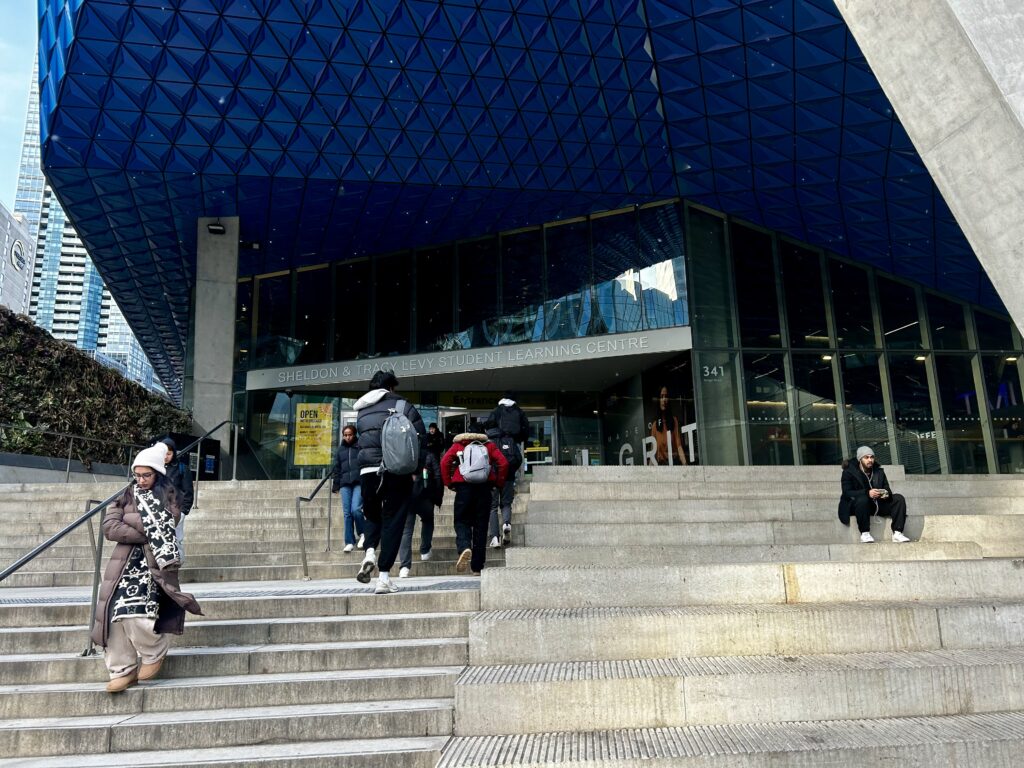
Listen to the whole story here:
Toronto Metropolitan University (TMU) has admitted 50 per cent fewer first-year international students since 2020, a downward trend the school’s president says is “under control” amidst cuts at other Ontario post-secondary institutions.
“Although we don’t want to see a reduction in international students on our campus, we are less at risk than many other institutions,” President Mohamed Lachemi said, adding that the school isn’t seeing any significant impacts to programming as it accepts fewer international students than other schools.
According to admission figures shared with OTR from the school, TMU admitted 556 international first-year students in September 2024, a drop from 1,120 students in 2020.
There was also a 36 per cent decrease in admissions from the previous school year. In September 2023, 862 new international students were admitted to the school.
In the 2023-24 academic year, 9.8 per cent of undergraduate students at TMU were international students. As a point of comparison, international students made up 30 per cent of the University of Toronto’s undergraduate enrollment at all three campuses in the same academic year.
A “combination of factors” contributes to this drop in admissions at the school, said Roopa Trilokekar, a York University professor specializing in international education. She said one of the reasons is the temporary cap on international student permits introduced by Canada’s immigration department in 2024.
While Canada’s immigration department initially aimed for a 35 per cent decrease in approved study permits from 2023, the department reported in January the actual number of international students coming to Canada was cut by about 40 per cent.
“With the changes introduced, we are seeing a decrease in the number of international students coming to Canada, but we’re also seeing even more concerningly a decrease in interest from international students to come to Canada,” said Annie Barrette, vice president of public affairs at Universities Canada.
Some things universities are doing to balance their budgets amidst the decline in international student admissions include hiring freezes, not filling staffing vacancies, closing programs and shutting down services for students, Barette said.
Last month, Centennial College announced that it would be suspending 49 programs due to a drop in enrollment, while Sheridan College announced late last year that it would be putting 40 of its programs on hold.
“If you look at colleges, for example, many colleges had to close a large number of programs or academic programs because those programs were just running with international students, and that situation does not exist here,” Lachemi said.
These budget issues aren’t just unique to colleges, though, Barrette said. In November, The University of Windsor announced they were facing a $30 million deficit due to a decline in international student enrollment, leading to 26 non-union staff lay-offs.
“We are working along with other universities and the Council of (Ontario) Universities to ensure that all levels of government, especially the federal government, which is responsible for immigration policy and student visa approvals, understand the benefits of international students,” Lachemi said.
Another factor causing the drop in admissions, according to Trilokekar, is because of geopolitical tensions Canada has with China and India, where she says over 50 per cent of international students come from.
“School recruiters, private recruiters, are discouraging students from coming to Canada,” she said. “With the volume we had from China and India when that gets affected, it affects our numbers big time.”
Along with the decline in admission numbers, Trilokekar said the drop in the number of international students will have an impact on Canada’s reputation on a global scale.
“Educational exchange also is a sort of soft power for a country. It builds an image of a country, builds favorability towards a country, it builds affinity toward the country. So that's all going to get reversed in the wrong direction,” she said.
While admission numbers are a concern, Barrette said the drop in international student numbers makes the country less open to global partnerships and collaborative opportunities in academia, especially in postgraduate programs.
“The reality is that we as Canadians want to bring in the top talent that our country needs,” said Barrette. “The challenging thing is that these impacts will be longer term.”
Lachemi assures that the drop in international students at TMU has no impact on global collaboration initiatives as they are commonly handled by faculty members and their relationships with international institutions.
“We remain fully committed to forcing a vibrant and inclusive campus community for all our students, ensuring that academic and extracurricular opportunities remain robust and accessible,” Lachemi said.
Vanessa Tiberio is a Toronto-based reporter with an interest in covering politics, current affairs and culture.
